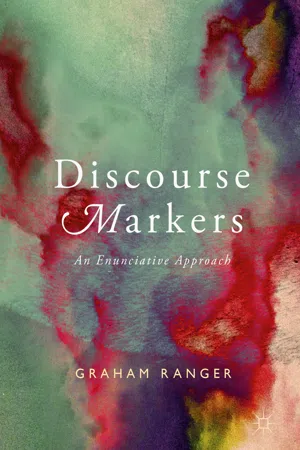1.1 Introduction
In this book I will be pursuing two main objectives. The first is to provide an introduction to the Theory of Enunciative and Predicative Operations (TEPO), developed over the last forty years or so by Antoine Culioli and associated researchers.1 The second is to use the tools of the theory to describe a selection of present day English discourse markers, including anyway, in fact and indeed, yet and still, like and I think. The way the theory moves from close observation of situated language use to the possibility of cross-linguistic generalization, from Saussurean parole to langue, and back again, has led to the development of a number of concepts which are particularly well suited to the description of discourse phenomena, in their sometimes baffling complexity. Before I present the theory, however, let me begin by considering some of the difficulties the study of discourse markers holds for the linguist.
1.2 The Term discourse marker
The first difficulty is terminology, as the term discourse marker is not uncontroversial in itself: many authors use alternative designations, and, even when the term of discourse marker is used, its extension is variable. Brinton (1996, p. 29) and Fraser (2009, p. 2) together list nearly thirty terms covering coextensive or overlapping domains, including comment clause, connective, continuer, cue phrases, discourse connective, discourse-deictic item, discourse operator, discourse particle, discourse-shift marker, discourse-signalling device, discourse word, filler, fumble, gambit, hedge, indicating devices, initiator, interjection, marker, marker of pragmatic structure, parenthetic phrase, phatic connectives, (void) pragmatic connective, pragmatic expression, pragmatic particle, reaction signal and semantic conjuncts. Both authors, incidentally, opt to use pragmatic marker as the most general term.
While some of the above items, such as hedge, initiator or parenthetic phrase designate fairly clearly delimited subcategories (albeit on the heterogeneous criteria of semantics, interaction or syntax, respectively), other items mean different things for different researchers. For some, particle is a syntactic term used only for invariable one word items (certain adverbs, prepositions, etc.), for others, particle is seen more inclusively and used indifferently for all sorts of related items.2 Fraser , in common with many, prefers marker but uses the term discourse marker only as a subcategory of pragmatic marker for those items which “signal a relation between the discourse segment which hosts them, and the prior discourse segment” (Fraser 2009, p. 296). Despite the terminological diversity, however, discourse marker seems to be the most frequent label. As Schourup notes, “The term D[iscourse] M[arker] […] is […] the most popular of a host of competing items used with partially overlapping reference” (Schourup 1999, p. 228).
In the scope of the present study, I will initially be using discourse marker pretheoretically, as the most general term available to refer to a set of markers which cannot be described satisfactorily without reference to discursive phenomena. I shall however be returning more precisely to the term in Chap. 2, in a critical discussion of how “discourse” and “marker” are each to be understood within the Theory of Enunciative and Predicative Operations.
1.3 The Multiplicity of Theoretical Approaches
This terminological confusion surrounding the set of discourse markers derives, on the one hand, from the fact that this is a relatively recent domain of linguistic enquiry and, on the other, from the variety of theoretical approaches adopted, each with its own research programme and its own set of (often unvoiced) assumptions about what aspects of language it is interested in researching.3
The study of discourse markers as such would undoubtedly have been difficult within the mainstream linguistic movements of the 1950s and 1960s.4 The pressure of the written norm sidelined spoken items like Well, Oh or Ah, as well as purportedly non-standard uses of markers such as anyway, like or whatever.5 At the same time, the Saussurean focus on langue pushed discourse markers into the realm of parole, while Generative Grammar was theoretically unprepared either to look closely into questions of performance or to consider the transsentential and intersubjective features of language which the study of discourse markers cannot ignore.6
Since the 1970s and the 1980s, interest in discourse markers has increased exponentially, however, from a whole range of theoretical perspectives. In conversation analysis or ethnomethodological approaches, discourse markers are studied in so far as they reveal the structures of conventionalized rituals of conversational interaction.7 Neo-Gricean and more generally pragmatic approaches focus on the way discourse markers orient interpretative possibilities, providing procedural indications that contribute to constraining available interpretations, in accordance with the Gricean cooperative principle. Such approaches have been developed more particularly, in the framework of Relevance Theory , in respect of Grice’s maxim of Relation: Be relevant.8 Anscombre and Ducrot consider discourse markers as evidence of the way in which argumentative possibilities are not the result of mere pragmatic enrichment but are inscribed in the semantics of linguistic items themselves,9 while Grize, Sanders or Mann and Thompson, for example, from very different methodological perspectives, look at how discourse markers participate in marking recurring “argumentative schemata” or “coherence relations” in natural language.10 Discourse markers in English often concurrently have homonymous, non-discursive uses from which they are diachronically derived. This feature has inspired studies in phenomena of grammaticalization – or pragmaticalization – which posit pragmatic principles at work behind regular patterns of language change.11
Other perspectives could be mentioned, but whatever approach is adopted will have an inevitable influence both on the terminological options and on the extension of the area of enquiry. Terms such as “initiator”, “continuer” or “react...
